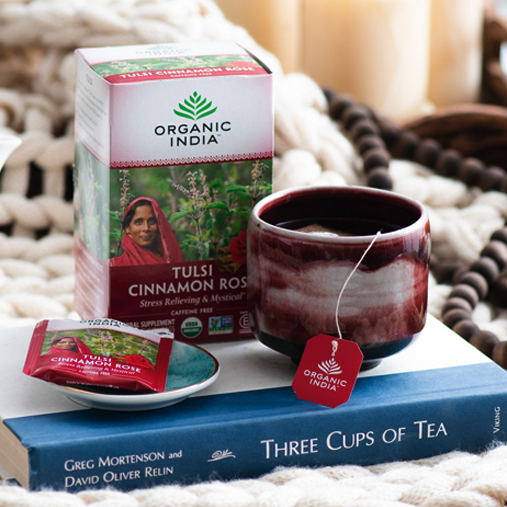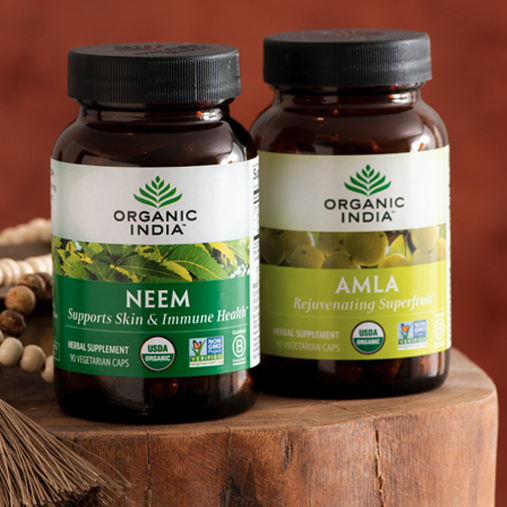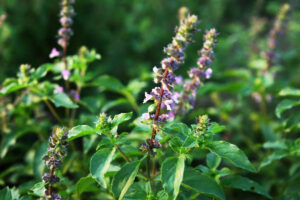Back
Have you ever suffered from a cough or congestion that keeps you up at night?
Although occasional coughs and congestion are usually not serious, they can be seriously disruptive.
Especially if they’re causing you to lose sleep, miss work, underperform, or create uncomfortable aches and pains.
Fortunately, there is a natural, age-old solution to help ease congestion, thin mucus, and calm coughing.
They’re called natural expectorants, and they come in the form of home remedies and traditional herbs.
In this article, you’ll discover seven traditional Ayurvedic expectorants that can help with occasional coughing and congestion and support a healthy immune system.
What are Expectorants?
Expectorants are natural or synthetic substances that help thin and loosen mucus and support clear airways.
They work by increasing water within mucus secretions, making it easier to break up and expel.
Expectorants can include:
- Prescription and over-the-counter cough medicines and decongestants,
- Home remedies, such as steam and hydration,
- Or expectorant herbs.
Expectorant herbs have been used throughout the traditional wellness systems of the world.
For example,
- Hyssop and Wild Cherry Bark have been used extensively in the West.
- Bulbus Fritillaria Cirrhosae (BFC), or “Chuan-Bei-Mu” and Chinese Asparagus are staples in Traditional Chinese Medicine.
- And in Ayurveda, herbs like Licorice, Fennel, and Ginger are often called upon to support respiratory health.
With awareness increasing about the benefits of herbs, many people are turning to natural expectorants for relief.
However, it can take some trial and error. And sometimes, a combination of herbs is most effective.
The following are 7 Ayurvedic expectorant herbs to support clear airways and respiratory health.*
7 Ayurvedic Expectorant Herbs for Lung Support
In Ayurveda, excess mucus production is viewed as an imbalance of Kapha, resulting in thick phlegm or toxicity of the sinuses, resulting in thin, watery mucus.
Pungent, bitter, and astringent foods and expectorant herbs are typically recommended to balance this, along with avoidance of mucus-producing foods such as dairy products, sweets, and fatty, cold, and fried foods.
The following are some common pungent, bitter, and astringent expectorant herbs used in Ayurveda.
#1: Trikatu (ayurvedic tri-herb formula)
Trikatu is not a single herb but a warming herbal formula of Black Pepper, Long Pepper, and Ginger.
Its name roughly translates into “three peppers” or “three pungents,” and it’s used extensively in Ayurveda to ignite and maintain digestive fire in the upper GI tract, promote lymphatic drainage, and to support the expulsion of toxins, including mucus.
It’s also been shown to support the immune system by promoting normal secretion of pro-inflammatory cytokines.
Trikatu works like a spicy dish by encouraging drainage through the nasal passages and respiratory system.
Thankfully, you can reap the benefits of Trikatu without the discomfort of a powerfully spicy dish.
Organic India offers Turmeric Formula supplement, which features Trikatu, with certified organic Black Pepper, Long Pepper, and Ginger.

2: Pushkarmool
Pushkarmool, also known as Inula racemose, is a perennial herb grown at high altitudes.
A member of the daisy family, Pushkarmool has been traditionally used for various ailments, including respiratory complaints.*
As an expectorant and a bronchodilator (which helps relax the bronchial system), Pushkarmool offers broad-spectrum support for the respiratory system.
3: Turmeric
Turmeric has become famous worldwide for its antioxidant, inflammatory response, and immune-supportive properties.
However, few people are aware of its role as a natural expectorant and bronchodilator.
In Ayurveda, a mixture of Turmeric, raw honey, and other pungent herbs and spices are often given at the first sign of congestion to help flush the system and prevent mucus build-up.*
And consuming a daily combination of Turmeric and Neem upon waking is a traditional yogic practice designed to support energy and immunity.
Various studies have validated Turmeric’s traditional use as an expectorant and potential bronchodilator and have showcased its supportive effects on respiratory and immune health.
Organic India offers a variety of Turmeric supplements, including
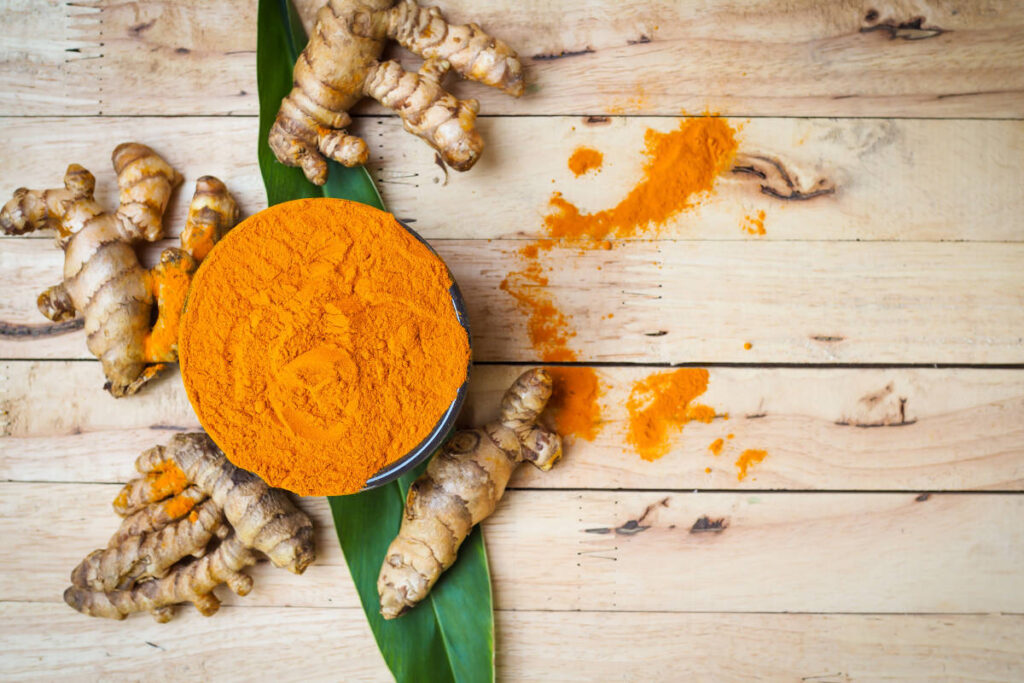
#4: Fennel
Fennel is used extensively throughout Eastern and Western systems of wellness.
However, it is best known for its digestive-support properties versus as an expectorant.
Research has shown fennel seeds support respiratory health by promoting ciliary motility, a function required for normal clearance of fluid from the respiratory tract.
The volatile oil in Fennel Seeds has also been shown to support the contraction of the smooth muscles of the trachea, which could facilitate the expectoration of mucus to the respiratory tracts.
Fennel Seeds have also been found beneficial for heart health, microbiome diversity, throat comfort, immunity, and more.*
Check out 6 Fascinating Benefits of Fennel to learn more.
#5: Licorice
Licorice is one of the most prized herbs in Ayurvedic and Traditional Chinese medicine because it is so versatile.
Not only can licorice support the health of the adrenals, digestive system, heart, skin, and immune system, but it’s also an expectorant.*
In other words, if you could only choose one herb to help sustain your energy while supporting and nurturing your entire body—including your immune and respiratory systems, Licorice may be your best bet.
A 2018 study published in Bioorganic and Medicinal Chemistry entitled: “Antitussive and expectorant activities of licorice and its major compounds” found the phytochemical plant compounds liquiritin apioside and liquiritin to be the major antitussive (cough suppressing) and expectorant compounds of Licorice.
Based on this research, Licorice may be an excellent herb for temporary relief if coughing keeps you up at night.*
Many Ayurvedic formulas contain Licorice. For best results, look for formulas containing complementary respiratory-supportive herbs.

#6: Pippali (Indian Long Pepper)
As discussed in point #1, Pippali, or Indian Long Pepper, is part of the Trikatu formula.
“Pippali” is Indian Long Pepper’s Sanskrit name, meaning “to drink and digest.” This name embodies its potent ability to support digestion and detoxification.
Regarding its expectorant properties, Pippali’s natural spiciness helps increase the secretion of mucus through the nose and throat.*
Research has shown Pippali also harbors immune-support properties. Specifically, the piperinic acid in Pippali works by supporting normal inflammatory and immune response.
Another benefit of Pippali is it is tridoshic in nature, meaning it promotes balance of all three dosha types (Vata, Pitta, and Kapha), making it a good choice for (nearly) anyone.
#7: Andrographis
Andrographis may sound like a new-fangled drug.
However, this ancient bitter herb has been used throughout Eastern wellness systems for centuries and has undergone over 800 studies.
Andrographis is also known as “King of Bitters,” “Indian Echinacea,” or Chuān Xīn Lián and has been traditionally used to support inflammatory response and respiratory, immune, digestive, and heart health.
It’s also popular as a detoxification herb and for multi-organ support.
Research has shown that Andrographis is safe and effective for supporting respiratory health, providing comfort for cough and sore throat, and may reduce the duration of cough and discomfort.
Andrographis can be found as a single herb, but it’s typically combined with complementary herbs, such as those previously discussed.
To learn more about this incredible herb, see: What is Andographis? Benefits, Origins, and Usage.
If you’re interested in trying Andrographis as an expectorant or for overall support, consider Organic India’s Tulsi Cleanse Tea.
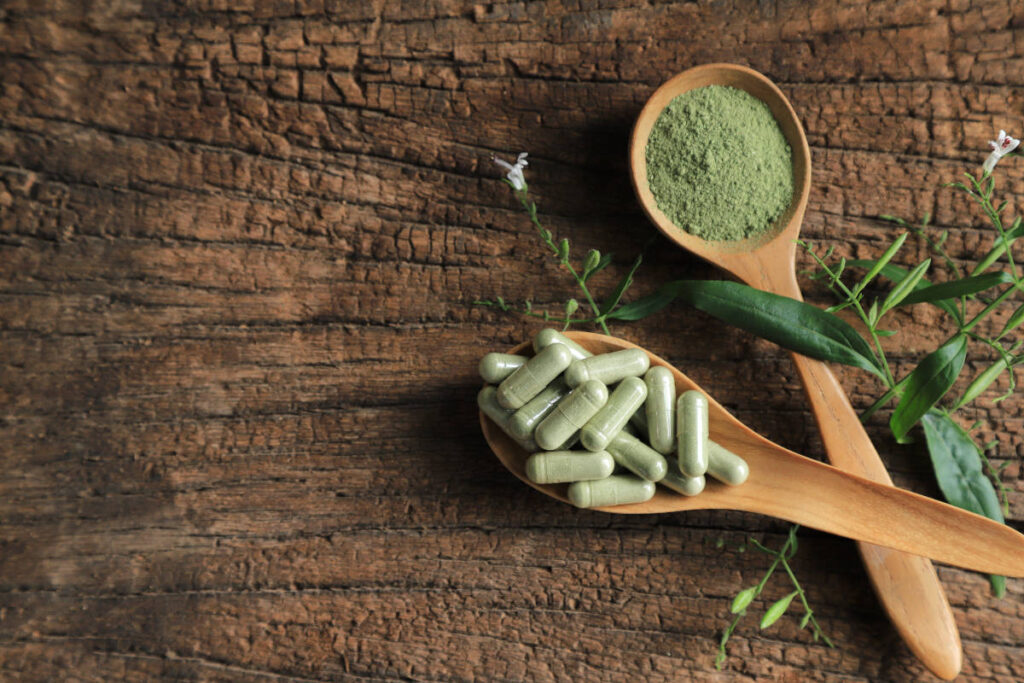
How to Start Using Expectorant Herbs
Ayurvedic practitioners typically recommend taking expectorant herbs at the first sign of congestion or cough.
So consider keeping some expectorant herbs on hand.
However, even a simple mixture of Turmeric with raw honey and some optional Ginger or Black Pepper can do wonders for easing congestion and coughing.*
Additionally, drinking plenty of fluids, such as water, coconut water, and herbal teas, has incredible expectorant power and can buy you some time as you procure the right herbs.
The age-old home remedy of steam inhalation can help break up and thin out mucus.
In other words, natural expectorants can empower you to take control of a pesky cough or minor congestion.
Finally, do not let a cough or congestion go on for more than a few days without seeing your doctor or healthcare practitioner.
Although rare, coughs and congestion can become serious respiratory infections if not treated properly.
Always check with your doctors before taking herbs if you’re on medication or have a pre-existing health condition.
To learn more about how to support overall respiratory and immune function, check out our Herbs for Immunity and Herbs For Lung Health blogs.

